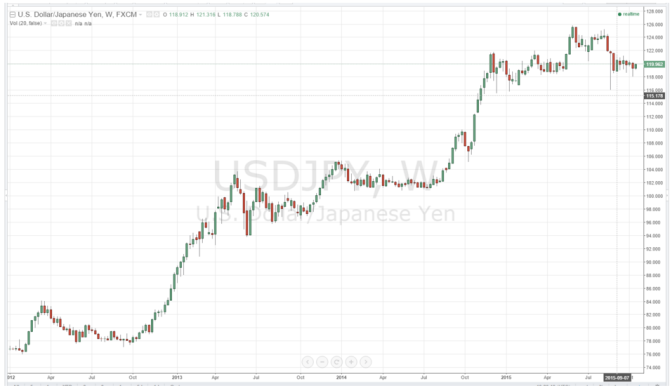The Japanese Yen is one of the forex market’s favorite trading assets, as it is often viewed as a primary vehicle for carry trades. This is largely because the interest rates associated with the currency have held near zero for an extended period of time, and there is very little indication that this trend in central bank policy will be ending any time soon.
This has ultimately led to a massive bullish rally in forex pairs like the USD/JPY, which is now threatening to once again overcome the 120 mark. But what many traders have missed in the process is the fact that the weaker Yen is helping to propel other assets in the region. As a result, the Nikkei 225 stock index is now trading at its highest levels in six weeks. This is beneficial for market entities like the Bank of Japan, so there is a vested interest in aiding Yen weakness in the weeks ahead.
By Alpari Forex
Market Trends Continue Higher
In the chart below, we can see one of the most clearly defined bullish trends in the forex markets. Price action in the USD/JPY has met very little in the way of resistance ever since the pair posted its long-term lows in the early parts of 2013. Much of this activity has been supported by the fact that the Federal Reserve is largely expected to start raising interest rates into next year. This is not an expectation that is matched by analysts watching the Bank of Japan or the European Central Bank, so we are still holding firmly in a scenario that favors the US Dollar.

Bullish traders are still being rewarded for this view, as the carry trade value in the Dollar continues to hold its positive outlook. In order to bring a change to this view, we would probably need to see alterative in the policy stance that is being taken at the Bank of Japan. But since the weaker Yen is actually helping stock markets in the country, there is very little incentive to do this. Japan remains an export-oriented economy, and any market forces that support its export sector generally take precedence when policymakers are looking to define its next policy maneuvers.
In all, these factors will continue to influence commonly traded forex pairs like the USD/JPY. The central bank backdrop should continue to favor the Dollar as long as the Federal Reserve shows a willingness to raise interest rates into next year.
